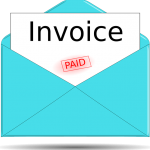 By Alana Downer.
By Alana Downer.
Small businesses need to be able to rely on the income they receive. Clients and customers need to be dependable, especially when it comes to making their payments on time. If you feel as though your customers are taking advantage of you, you need to put your foot down. Start countering weak excuses about late payments and collect the money you’re owed.
– “I’m dissatisfied with what I received”
If a customer waits until the very end to accept the work (or the products), takes them, and then states they aren’t satisfied, ask for a full return of everything. In cases where a return isn’t possible or the customer refuses (i.e. a house painting business can’t scrape the paint back off), consider what lead up to that moment. Did the customer express any dissatisfaction before it was time to pay? If not, this client may be stringing you along for an invoice reduction or free work.
Incorporate strict terms into your business contracts that state the timeframe in which returns, exchanges, or complains can be made or amended. All you need to do is enforce them the next time this situation arises. Difficult customers won’t have an easy escape. In the meantime, you can ask for partial or discounted payment that removes products or services subject to debate from the bill. They can pay for everything else.
[amazon_link asins=’1312940174′ template=’ProductAd’ store=’succeedingi0d-20′ marketplace=’US’ link_id=’dc9025b5-cd42-11e8-9ef6-3f680a9e608c’]- “I never received an invoice”
It’s possible that your customer didn’t receive the invoice if you’re using older methods and only touching base once. It might have gone right into their email spam folder. Make sure that didn’t happen before you assume the worst.
Implement invoices that require acknowledgement. Give customers a brief period to acknowledge that they received the invoice. If they fail to inform you, call them and directly ask them to acknowledge that the invoice was received. Then, until the invoice is paid send automated reminder emails that the invoice is about to become due. If you’d rather not go through the hassle, stop using invoices. Only accept payment through direct debit so customers won’t have the choice to forget to pay on time.
– “I sent the payment in the mail”
The best way to deal with payments that get lost in the mail is to simply stop accepting payments by mail. These methods are almost entirely obsolete. Nearly everyone accepts electronic payments now, and everyone with the ability to pay by mail also has the ability to pay electronically. Rather than playing the cat and mouse game of asking for proof that the payment was sent and repeatedly getting dodged, simply don’t accept any form of payment that isn’t instant.
[amazon_link asins=’B076DGYBF8′ template=’ProductAd’ store=’succeedingi0d-20′ marketplace=’US’ link_id=’1d3ed51e-cd43-11e8-ae5a-db9a5795a3c9′]- “I’m waiting on someone else to pay me”
Your customer or client may have another customer or client who is paying them. It may sound harsh, but the reality of the matter is that it’s not your problem. Your invoice had a date on it, and you needed to be paid by that time.
Sometimes, your customer or client may legitimately have empty pockets until they receive that payment from their client. You can either accept payment in installments or stages so that something is coming in during that waiting period. If this happens repeatedly with the same client, switch them to a “pay up front” model or stop working with them.
– “The person who needs to approve the payment will be gone for a million years.”
When you hear this excuse, cut out the middleman. Ask to speak directly to the person responsible for approving, transferring, or delivering your payment. Your customer or client may not want to give you this information, but it raises the pressure for them to do something to help resolve the situation. There’s almost always a way around this, such as using pre-approved funds to pay you and sorting the rest out later when the person returns.
If some customers or clients are habitually late or routinely refuse to pay, those people aren’t customers or clients. They’re leeching off of your small business, and you can’t afford to keep them around. Tailor your marketing strategy to attract the right people, and recognize when it’s time to fire a client that’s wrong for you. One or two mix ups over a long working relationship may not be a problem, but people who are reliably unreliable when it comes to making payments are only holding you back.
_________
Alana Downer is an experienced content editor and financial blogger, supporting Learn to Trade – an educational resource for traders and investors. In her spare time, Alana enjoys sharing her financial tips and strategies, helping both businesses and individuals grow their revenue, create additional income sources and achieve financial stability. Personally, a great fan of literature and travel.
